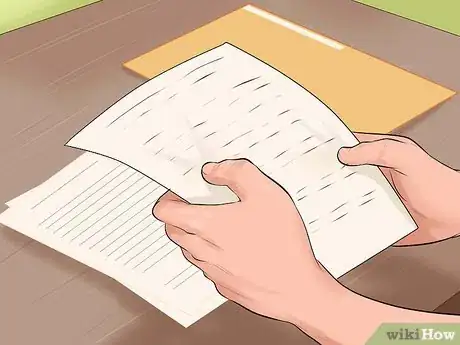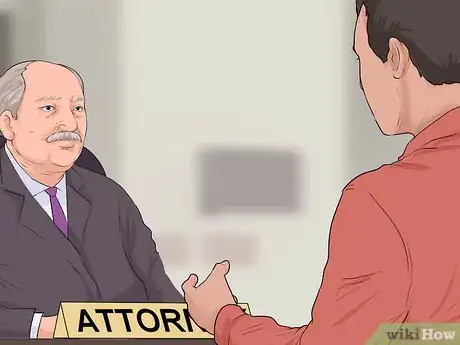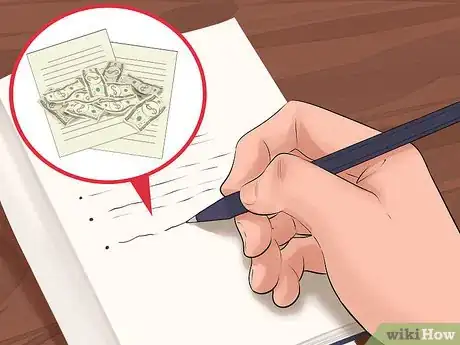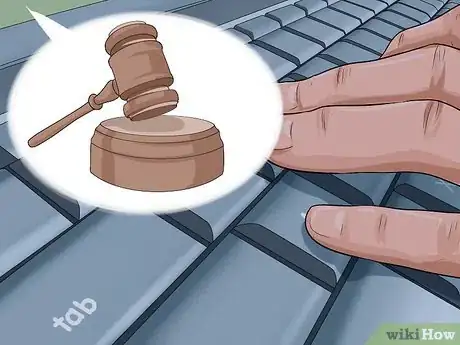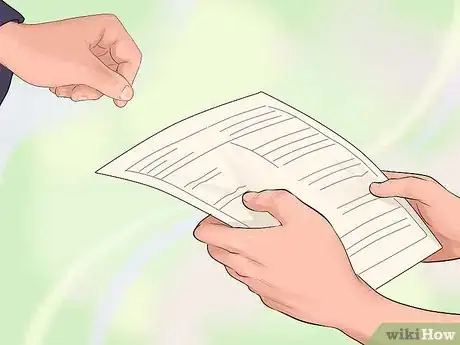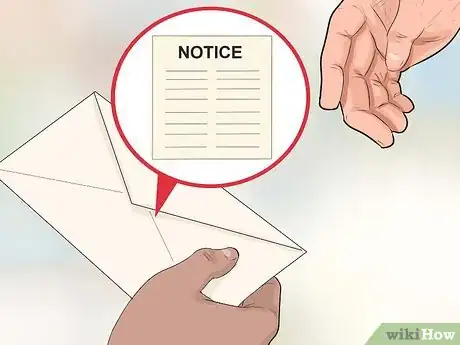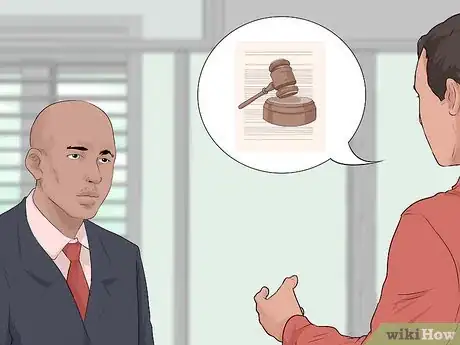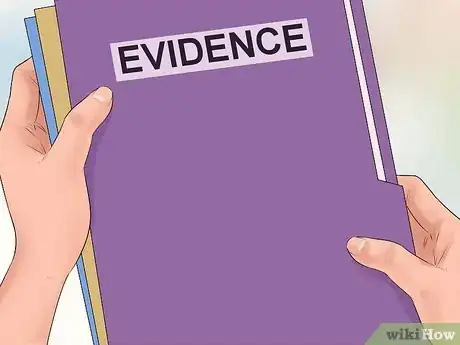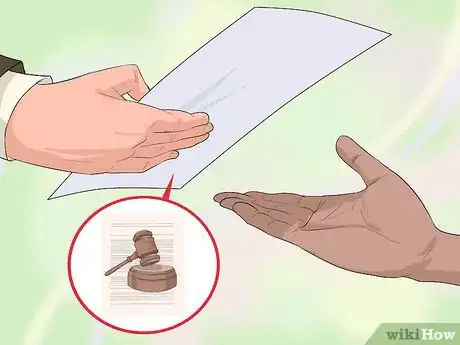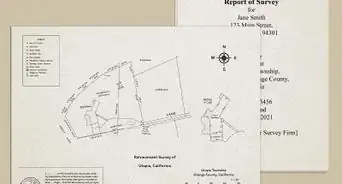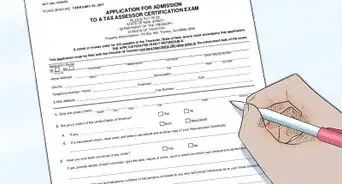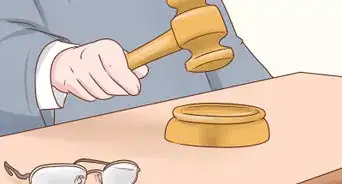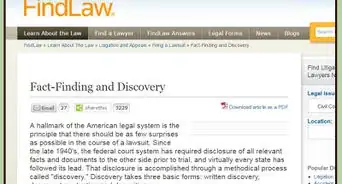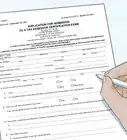This article was co-authored by Lahaina Araneta, JD. Lahaina Araneta, Esq. is an Immigration Attorney for Orange County, California with over 6 years of experience. She received her JD from Loyola Law School in 2012. In law school, she participated in the immigrant justice practicum and served as a volunteer with several nonprofit agencies.
There are 23 references cited in this article, which can be found at the bottom of the page.
This article has been viewed 25,040 times.
Real estate fraud can take many forms. Generally, fraud consists of any deliberately false statement which was made to get you to purchase real estate. To sue, you need to gather evidence of the fraud and then draft a “complaint,” which you will file in civil court. Some fraud is criminal, so it's always a good idea to file a police report, too, which can support your civil case. Fraud lawsuits can be very time consuming and complicated, so you should meet with an attorney before filing the lawsuit to discuss your strategy.
Steps
Gathering Evidence
-
1Get your copy of the contract. The real estate contract may itself contain fraudulent information, which could form the basis of the lawsuit. You should find your copy of the purchase and sale agreement. If you can't find your copy, then ask your real estate agent for a copy.
- If any terms of your sale were negotiated in communications outside the contract—such as voicemails, phone calls, or emails—gather evidence of those too.
-
2Identify the fraud. Fraud is defined as an intentional act of misrepresentation, concealment or non-disclosure which the victim justifiably relies on to their detriment and the gain of the other party. Fraud can take many different forms. Some of the more common fraudulent real estate schemes include: [1] [2]
- Misrepresentation of credentials. Someone might hold him or himself out as a real estate agent or broker but could be practicing illegally.
- Illegal flipping. Someone buys a home and fixes it up before selling the home for a price well above its appraised value, often using a false appraisal to help seal the sale.
- Equity fraud. Someone forges your name on the deed and steals the home from you, usually by quickly selling it to a third party.
- Foreclosure bailout scams. A person contacts you, knowing that you are upside-down on your mortgage, and talks you into deeding the house to them so they can arrange a “short sale.” You then pay a fee and possibly rent to stay in the home as you await the short-sale. However, the scammer runs off with your money.
- Undisclosed problems in the home. If the seller or the seller's agent doesn't disclose defects or liens, then you might have been the victim of fraud.
- Predatory lending. A lender aggressively recruits you to take out a loan and then charges you absurdly high fees and interest rates. Often, predatory lenders prey on the elderly or the poor.
Advertisement -
3Gather relevant documents. You should find copies of any document used to defraud you. For example, you should gather the following:
- deeds
- contracts
- written agreements and other contract communications
- escrow instructions and attorneys
-
4Write down your memories of the fraud. If someone made fraudulent statements, then you should write them down as soon as possible. Describe who told you what and how you later learned that the information you received was false.
- Also write up a rough chronology of events. Note who first contacted you, what was said, etc.
-
5Meet with an attorney. Because real estate fraud can take so many different forms, only a qualified real estate attorney or consumer law attorney can listen to your situation and offer tailored advice. You should schedule a consultation with an attorney and discuss whether you have a valid lawsuit.
- You can get a referral for the right kind of lawyer by calling your state or local bar association. Once you have the name of an attorney who specializes in your area, call and ask to schedule a half-hour consultation. Ask how much the attorney charges.
-
6Discuss with the lawyer your possible remedies. If you were the victim of fraud, then there are several different remedies potentially available to you. You should talk about each with the attorney to see if they apply to your case:[3]
- Compensatory damages. These are meant to reimburse you for the money you lost because of the fraud. For example, if you needed to repair a defective home, then you can be paid the amount you spent on repairs. Also, you could be awarded the value of the home if it was stolen from you.
- Punitive damages. These are meant to punish, and they are generally available in fraud cases. Punitive damages are meant to deter future misconduct, so they are often a multiple of your compensatory damages.
- Rescission. In some situations, you could actually cancel the sale if it hasn't gone through yet. You get your money back and the seller keeps the home.
-
7Document your financial injury. When you sue, you can get compensation for any financial injury that you suffered. Accordingly, you should gather evidence that shows the dollar amount of your injury. For example, you could get the following:
- Itemized bills from a contractor or carpenter if you had to hire someone to repair the home.
- An appraisal or tax information that shows the value of your home.
- Cancelled checks that show how much money you paid to the scammer.
Filing Your Lawsuit
-
1Find the correct court. Only some courts have power (“jurisdiction”) over a defendant. Accordingly, you should find the correct court to sue in before doing anything. Generally, you can sue the defendant in the following courts:[4] [5]
- In the county where the defendant lives. If the defendant lives in the same county as you, then sue in the local state court for your county.
- In the county where you signed the sale contract.
- In a county where the defendant does business.
-
2Draft a complaint. You can sue for fraud by filing a document called a “complaint” with the court. In this document, you identify yourself as the “plaintiff” and the person you are suing as the “defendant.” You need to go into some detail about the fraudulent scheme, e.g., when and how it was committed. At the end of your complaint, you should also ask for your relief (damages, rescission, etc.)[6]
- You also have to make specific allegations of fraud. This means pleading “with particularity.” In effect, you should explain the who, what, when, where, and how of the fraud. You will back up your allegations with evidence to support your point of view.
- You can't simply write, “Defendant lied to me.” Instead, you have to walk the court through the false statements or give the court a good idea of the fraudulent scheme: “On January 15, 2015 plaintiff received a phone call from number 555-5555. The person identified himself as Mr. Jon Smyth, who said he worked for a real estate company. He asked if Plaintiff was underwater on her mortgage.”
-
3File your complaint. Once you have finished drafting your complaint, you should sign it and then make multiple copies. Take the original and the copies to the court clerk. Ask to file.
- You will probably have to pay a filing fee. If you can't afford the filing fee, then ask the clerk for a fee waiver form. Note that these are usually reserved for low-income individuals. You may need to prove your inability to pay to be eligible.[7]
- Fee waiver forms typically ask you to report your family size, income and assets, as well as expenses.[8] If you qualify, you can have the fee waived.
-
4Serve notice on the defendant. You have to give the defendant notice that you have filed the lawsuit so he or she has a chance to respond. You can give the notice by sending a “summons,” which you can get from the court clerk. Also send a copy of your complaint along with the summons.
- Generally, you can have anyone 18 or older, who is not a party to the lawsuit, make hand delivery on the defendant. This server could be someone you know, the county sheriff, or a private process server.[9] If you use a process server or the sheriff, then you will have to pay a small fee.
- If you cannot locate the defendant to request their presence in court, you may be able to deliver the documents requesting their presence to a court approved person at their place of residence.[10]
- Your server should fill out a “proof of service” form (also called an “affidavit of service”). After filling it out, your server should return it to you. Keep a copy and file the original with the court.
-
5Read the defendant's response. Once the defendant is served, he or she has a limited amount of time to write a response and file it. Generally, the defendant will file an “answer,” which will respond to each allegation you made in your complaint.
- Typically, the defendant will admit, deny, or claim insufficient knowledge to admit or deny each allegation.[11] However, the answer might not contain a lot of information about the defendant's version of events. You will have to wait until the fact-finding phase of the lawsuit to uncover more information about what the defendant's defense will be.
Preparing for Trial
-
1Engage in fact-finding. Most lawsuits have an extensive fact-finding stage called “discovery.” The purpose is to let you uncover all relevant evidence that relates to your lawsuit so there will be no surprises when the trial starts. You can request information using the following discovery techniques:[12]
- Requests for Production. You can make a request for production to uncover copies of any document that relates to the lawsuit. For example, you might want copies of all emails that mention the sale of your house.
- Requests for Admission. You state facts and request that the defendant admit or deny the truth of the statement. For example, you can request that the defendant admit that the sales contract is genuine. This could save time at trial.
- Interrogatories. These are written questions that the defendant will answer under oath. You might want them to give you a list of the names of people who have relevant information about the case.
- Depositions. In a deposition, you can ask a witness questions in person, which they answer under oath. A court reporter takes down the questions and answers.
- Discovery is a complex process, and it's best to hire an attorney to assist you.
-
2Think about settling the lawsuit. Lawsuits tend to go on for over a year, so you might want to think about settling the dispute outside of court. For example, you could negotiate a settlement or participate in mediation.
- Mediation is a great option with or without a lawyer. You and the defendant would meet with a neutral third party, the “mediator,” who listens to each side describe the lawsuit. The mediator is skilled at getting each side to listen to each other and work to a mutually-acceptable solution.[13]
- In order to settle the dispute, you will probably have to give up something to get something. This means you will probably have to settle for a smaller amount of money than what you have sued for.
-
3Defend against a motion for summary judgment. After discovery closes, the defendant might bring a “motion for summary judgment.” With this motion, he or she argues that trial is unnecessary because there are no meaningful factual disputes. Instead, the judge should decide the case based on the law.[14]
- You can defend against this type of motion by pointing to a meaningful factual dispute. In fraud cases, there usually is a factual dispute: whether the defendant made misrepresentations with the intent to defraud you. This is usually a fact question for the jury to decide.
- Note that your defense in this situation can also focus on how the defendant misrepresented the law in their motion for summary judgment. Talk to your lawyer about the best options for you.
- You will need to draft a motion in reply, which can be quite a bit of work. If you don't have a lawyer, then you should think about hiring one to draft your response motion for you.
-
4Organize your evidence. As trial approaches, go through all of your evidence. Find documents and witnesses that help you prove fraud. In particular, look for the following:
- Any communication that shows the defendant's intent to defraud you. For example, the defendant might have discussed the fraudulent scheme in emails.
- A copy of the purchase and sale agreement, deed, or other relevant document.
- Witnesses who saw the defendant in action. If the fraud involved a complicated scheme, then other people innocently involved in the scheme could testify.
-
5Serve subpoenas on your witnesses. A subpoena is a legal request to show up to court at a certain day and time to deliver testimony.[15] You should send a subpoena to each of your witnesses. You can typically get blank subpoena forms from the court clerk or download them from the court's website.
- Be sure to give sufficient notice so that the witness can make arrangements and appear in court. If possible, provide at least two weeks advance notice. Also check your court rules to see if there is a minimum amount of notice you must give.
-
6Observe a trial. If you have a lawyer, then he or she should handle everything at trial. All you would potentially do is testify. However, if you are representing yourself, then you might be nervous. To help get familiar with trials, you should observe one. Courtrooms are generally open to the public, and you can ask the court clerk if there are any trials you could observe.
- Pay attention to where the parties sit and how they talk to the judge. Where do they stand when questioning witnesses? Where do they stand when talking to the judge?
- If you want, you could potentially hire a lawyer to represent you at trial. In most states, lawyers can provide “limited scope representation,” also called “discrete task representation.” For example, you could do all of the pre-trial work yourself but hire a lawyer to represent you in the trial. Alternately, you could pay a lawyer to coach you through the trial.[16]
Going to Court
-
1Pick your jury. You will have a jury if either you or the defendant requested one. Jury selection is called “voir dire.” It begins with the judge calling up a panel of prospective jurors to sit at the front of the courtroom. The judge then asks them a series of questions, such as their job, hobbies, etc. The judge also asks if they know either you or the defendant.
- If you don't think that a potential juror can be fair, then you should ask the judge to dismiss them “for cause.”[17] For example, the juror might know the defendant or work at the same company.
- You will probably also be given a certain number of “peremptory challenges.” With these, you can dismiss a juror without asking the judge's permission and without giving a reason. The only limitation is that you can't use peremptory challenges in a way that discriminates on the basis of race, ethnicity, or sex.[18]
-
2Present your witnesses. You can call anyone who has personal knowledge of what they are testifying to. For example, your realtor might have heard the defendant make false statements. In this situation, the realtor can testify as to what they heard. However, witnesses cannot testify as to gossip.[19]
- See Question Witnesses when Representing Yourself for more information.
-
3Testify on your own behalf. You certainly need to testify in a fraud lawsuit. Remember, to prove fraud, you need to prove that you relied on the defendant's false statements. If you have a lawyer, he or she will ask you questions. Remember the following tips:[20]
- Always tell the truth. This is the most important rule. When you tell the truth, you will feel comfortable and therefore appear credible. This is also the law. Lying under oath is a crime in itself.
- Think carefully before answering. Listen closely to the question and ask for clarification if you need it.
- Keep your voice up. The jury needs to hear you. When people get nervous, they sometimes talk more quietly than usual.
- Don't guess. It is acceptable to say “I don't know” when you really don't know the answer to a question.
-
4Cross-examine the defense witnesses. The defendant also gets to put on a defense. After the defense attorney questions the witnesses, you will get to cross-examine them. Your goal should be to undermine the witness's credibility in front of the jury.
- For example, you could show how the witness made inconsistent statements by confronting the witness with a statement made in a deposition. By pointing out an inconsistent story, you reduce the credibility of the witness.[21]
-
5Make a closing argument. Sum up the evidence and try to convince the jury to adopt an interpretation of the evidence that is favorable to you. Remind the jurors of particular pieces of evidence and who witnesses are.[22]
- For example, you would say, “Remember the testimony of Mrs. Smith, the real estate agent….”
-
6Wait for the verdict. After closing arguments, the judge will read the jury its instructions and then allow them to retire to deliberate. Deliberations could take an hour or they could take more than one day. When the jury reaches a verdict, you will be contacted to come back into court.
- If you lose the trial, then think about appealing. You have a limited amount of time to file your Notice of Appeal—as little as 10 days in some courts.[23] Talk to a lawyer about the costs and benefits of bringing an appeal.
References
- ↑ http://file.lacounty.gov/lasd/cms1_145250.pdf
- ↑ http://www.legalmatch.com/law-library/article/real-estate-fraud.html
- ↑ http://www.nolo.com/legal-encyclopedia/legal-remedies-if-california-home-seller-conceals-defect.html
- ↑ http://www.nolo.com/legal-encyclopedia/personal-jurisdiction-where-sue-defendant-29560.html
- ↑ https://www.nolo.com/legal-encyclopedia/state-courts-venue-rules-govern-29656.html
- ↑ http://nationalparalegal.edu/public_documents/courseware_asp_files/researchLitigation/PreTrialPractice/Summons.asp
- ↑ http://www.mncourts.gov/Help-Topics/Fee-Waiver-IFP.aspx
- ↑ http://www.mncourts.gov/mncourtsgov/media/CourtForms/IFP102.pdf?ext=.pdf
- ↑ https://www.courts.wa.gov/newsinfo/resources/?fa=newsinfo_jury.display&folderID=brochure_scc&altMenu=smal&fileID=notice
- ↑ https://www.serve-now.com/articles/501/substituted-service
- ↑ http://injury.findlaw.com/accident-injury-law/starting-a-lawsuit-initial-court-papers.html
- ↑ http://litigation.findlaw.com/going-to-court/filing-a-lawsuit-the-discovery-process.html
- ↑ http://adr.findlaw.com/mediation/what-is-mediation-.html
- ↑ http://litigation.findlaw.com/filing-a-lawsuit/what-is-summary-judgment.html
- ↑ http://litigation.findlaw.com/going-to-court/what-is-a-subpoena.html
- ↑ http://www.courts.ca.gov/1085.htm
- ↑ http://www.nysd.uscourts.gov/jury_handbook.php?id=6
- ↑ https://www.law.cornell.edu/wex/peremptory_challenge
- ↑ http://www.nolo.com/legal-encyclopedia/can-witnesses-testify-something-didn-t-actually-witness.html
- ↑ http://litigation.findlaw.com/going-to-court/do-s-and-don-ts-being-a-witness.html
- ↑ http://www.law.indiana.edu/instruction/tanford/b584/PriorIncStatements.pdf
- ↑ http://www.uscourts.gov/about-federal-courts/educational-resources/about-educational-outreach/activity-resources/differences
- ↑ https://www.courts.mo.gov/page.jsp?id=28374
